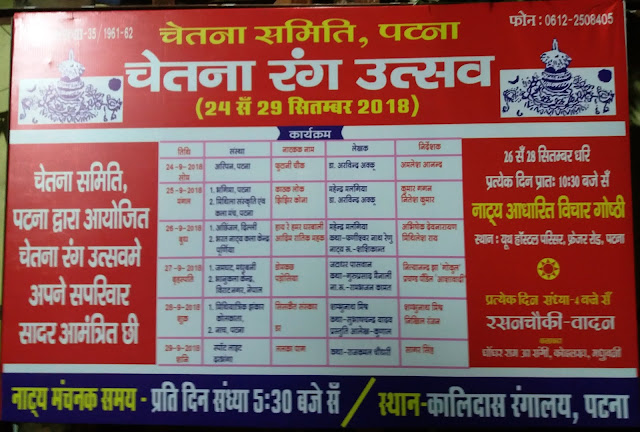Pains of downtrodden coming out in dances
(अनारवती डोमरी तोहर डोम कत' गेलौ हे.. का वीडियो का लिंक नीचे देखिए)

''Domkachh' was a drama studded with pieces of folk dance performed in Mithila. The different songs of Domkachh have been threaded into a play. The songs exhibit how a family belonging to a downtrodden class faces the challenges of the society and yet enjoys the inner melody of life in the most dire circumstances.
Domara has a beautiful wife Domari and both live peacefully in a village. Domara has a bad habit of boozing and his wife is fed up with it. She threatens him to complain to police so as to get him locked in the jail. Once some other person lodges a complain to the police and Domara is caught by the constable while shouting in a state of intoxication. He is brought to the police station where he is mishandled by the police.. He is beaten brutally. Domara goes with the thrashing but he feels shameless verbal abuses made by the policemen unbearable against his mother and sisters. At this time of adversity his wife Domari comes to his rescue and requests the police to set him free. On demand, she pays off some bribe and gets her husband freed.
When Domara returned he decides to leave the village to avoid further bad treatment by the police. His wife presents an exciting dance to seduce her hubby. But Domara is adamant to go to Delhi for some job. When he reaches Delhi with his friends they leave him alone and he somehow manages to reach to their residence with the help of his singing skill. His friends gets a job for him and he labours hard there. Once he falls down because of fever but the supervisor is not ready to allow any relaxation. He sends a letter to his wife telling his pathetic condition and with an intention to come back.
Domari is glad after getting the letter from the postman. She goes to a villager to get the letter read. The villager reads the whole letter but conceals one sentence in which Domara has written about the whereabout of his five hundred rupees kept by him in the room. At the third quarter of the night that villager burgled into the house and stole the five hundred rupees. On hearing some unusual sounds Domari and her neighbours wake up and come to know that the rupees has been stolen. When Domara returnes home he comes to know that the reader of the letter is definitely the stealer of his hard-earned money because he had read whole letter but the sentence in which the exact location of the money was written.
A village panchayat (judicial assembly) is called on. Before that the Head of the Panchayat is gratified by the thief with his share of the stolen money. So he let the Domara been beaten by the opposite party at the panchayat in an extra-judicial manner.
The play was successful in showing the essence of Domakach and that too in its pristine form. The songs and dance both were typically as are still played in Mithila by the villagers. Jatadhar Paswan has made a beautiful script that not only sticks to its main theme but also maintains the discipline of language in the dialogues of the different characters. In Mithila all the different classes of people speak differently. Two dialogue summarises the theme of the play' "you say why would they beat your husband. Is your husband a high caste man in whom case police would have to think before beating?" "The postman could not locate our house by asking people the real name of my husband. This is because nobody calls us with our real name rather they themselves give some bizarre names to we low-caste people. "
Nityananad Jha 'Gokul' has taken good works from all the actors. He used the floor of the stage in a justified manner. Keeping the choir group in backstage where they were visible to the audience was a good decision. The beam of light on the choir group would have been more strong so that their faces could have been well visible to the audience.
Domara and Domari acted soulfully.While Domara amused the vieers while boasting about himself after drinking nobody could resist his laugh once he was seen caught by the policeman and he was exorcised by beating. The real sweet tone of Maithili was heard from the mouth of gracious Domari. The devars (husband's brother) were able to show the real taste of courteous persiflage with their bhabhi. Their proficiency in dance was a feast to the eyes of the viewers. The Sarpanch also did justice with the character. The villagers and other characters also worked well.
The show was rich in dance and music content. The whole team must be appreciated for preserving the heritage of folk dance in its true form.
..................
Review by - Hemant Das 'Him'
Photographs by - Binay Kumar
Send your responsae to -hemantdas_2001@yahoo.com
Note- name of actors and other artists will be added once we receive the information.
Watch the video of Domkach dance by other artists-
Plese click here













































No comments:
Post a Comment
अपने कमेंट को यहाँ नहीं देकर इस पेज के ऊपर में दिये गए Comment Box के लिंक को खोलकर दीजिए. उसे यहाँ जोड़ दिया जाएगा. ब्लॉग के वेब/ डेस्कटॉप वर्शन में सबसे नीचे दिये गए Contact Form के द्वारा भी दे सकते हैं.
Note: only a member of this blog may post a comment.